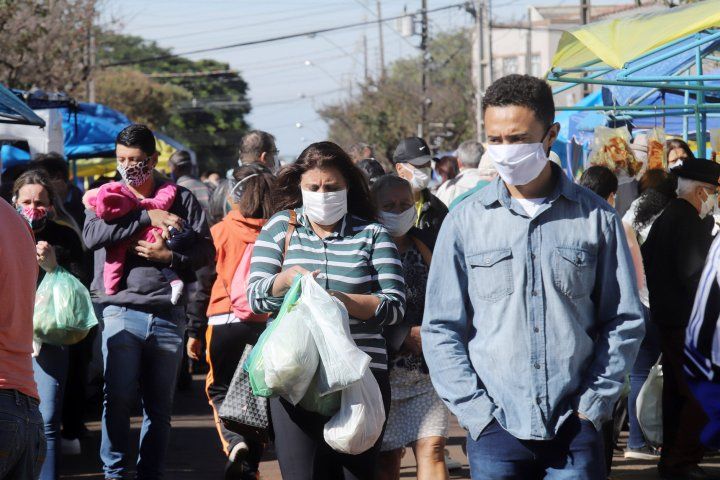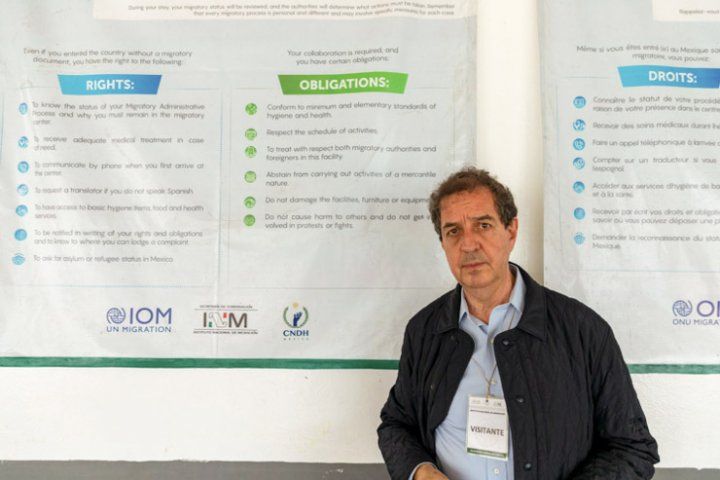UCSF’s Global Health Institute Fights COVID-19 Around the World
Leaders Fear ‘Unfolding Catastrophe’ in Countries With Fewer Health Resources

People wear masks as they walk through an outdoor market in Brazil, a country that has seen skyrocketing numbers of COVID-19 cases. Getty Images
UC San Francisco has spearheaded campaigns across the globe to stop the spread of deadly diseases such as malaria, measles and AIDS in developing countries. Now UCSF’s Institute for Global Health Sciences (IGHS) is building upon lessons learned to help low- and middle-income countries fight COVID-19, a disease that hits the poorest among us the hardest.
The Bay Area’s success flattening the COVID curve during the spring meant UCSF could send teams to New York and the Navajo Nation to support weary health workers. But even as the SARS-CoV-2 virus is spiking in California and across the U.S., global health leaders say our experience – as challenging as it is – may pale in comparison to the outbreaks developing in countries with fewer resources.
COVID-19 wreaks its greatest havoc on communities of color, sickening and killing Latinx and Black people in the U.S. at numbers significantly higher than those of white people, due to social and racial injustices. Such inequities are even more stark in developing countries where hospitals are few, food is scarce, and struggling families earn less than $5 a day. Experts predict the number of deaths from COVID-19 will be far worse in poorer nations compared to wealthier ones where 100 to 1,000 times more is spent per person per year on health care.
An ‘Explosive Pandemic’
“Everyone in global health is incredibly conscious that this is an unfolding catastrophe. The numbers in Brazil have been rocketing upwards. India and all its neighbors are facing an explosive pandemic,” said Sir Richard Feachem, PhD, DSc(MED), director of the Global Health Group (GHG), an IGHS “action tank” that translates bold ideas in global health into large-scale operations that impact millions of people. “Not only will the coronavirus cause much sickness and death, but we also face major setbacks in malaria, HIV, tuberculosis, and childhood immunization, to name four, because health systems are overwhelmed and supply chains disrupted.”

Jaime Sepulveda, MD, MPH, DrSc, MSc, has traveled to Tijuana, Mexico, several times since last fall to visit the detention and refugee camps.
It is the worsening crisis along the U.S. border with our southern neighbor that worries Jaime Sepulveda, MD, MPH, DrSc, MSc, the IGHS executive director and Haile T. Debas Distinguished Professor in Global Health Sciences. As of Aug. 2, Mexico had 424,600 cases and 46,700 deaths, a toll that is now third highest in the world, behind the U.S. with the most deaths followed by Brazil. Sepulveda, who served as director-general of Mexico’s National Institute of Public Health, has traveled to Tijuana, Mexico, several times since last fall to visit the detention and refugee camps.
“It is the perfect storm for having a huge outbreak in those squalid camps, where thousands and thousands of people are living in miserable conditions – crowding, no water, no sanitation. If nothing is done,” he predicted, “there is a risk of large outbreaks and continuing chains of transmission among migrant families. The consequences are dire indeed.”
IGHS Making a Difference
Since April, IGHS has mobilized its international partners, resources and expertise to fight the coronavirus in Africa, Central America and South Asia under the leadership of Feachem and Sepulveda. Experience gained in malaria eradication and AIDS control around the world has given these global veterans technical know-how, expertise in building systems to tackle disease outbreaks, and strong partnerships with other like-minded organizations to combat COVID-19. Their record speaks for itself: Working with the Bill & Melinda Gates Foundation, the GHG and its partners cut worldwide malaria incidence by 36 percent and death rates by 60 percent since 2000. Today, more than half of the world’s countries are malaria-free largely due to the on-the-ground efforts of this team.
Those working in the global sphere know that measures that slow disease spread in richer nations, i.e. lockdowns, will not work in poorer ones where many citizens are day laborers living in crowded, urban slums. “Lockdown is a middle-class luxury that would lead to starvation and misery on an extraordinary scale in these countries,” Feachem said, “so we are relying on other measures and other combinations of interventions to slow transmission.”
Lockdown is a middle-class luxury that would lead to starvation and misery on an extraordinary scale in these countries, so we are relying on other measures and other combinations of interventions to slow transmission.
Jeremy Alberga, the GHG’s deputy director, said each country is developing its own pandemic playbook that uses surveillance, diagnostic tools and therapeutic remedies to inform public health responses and conserve scarce resources. Working closely with partners IDinsight and Evidence Action in Kenya, Uganda, Zimbabwe and India, UCSF has launched the Pandemic Community Response and Resilience Initiative, which employs a three-pronged approach:
- Employ text messages to survey residents about symptoms and to alert health workers to outbreaks
- Provide key health officials with tools to determine when and where to deploy scarce diagnostic tests to find the rates of infection so resources can be targeted
- Develop treatments that are cheap, easily distributed, taken orally, and do not require refrigeration.
Donors Respond
Longtime global health supporter Unorthodox Philanthropy fully supports the IGHS’s efforts to develop community-based COVID-19 responses, knowing its $200,000 investment goes further in poorer countries. "With more than a decade at the forefront of fighting infectious diseases, the Global Health Group knows how to help countries find their own path to fight the novel coronavirus,” the foundation said in a statement. “The GHG is expert at taking scientific research and translating it into actionable policy that meets each nation's particular needs.”
Public radio producer Wendy Holcombe, a member of the IGHS’s leadership council, and her husband, Carl Kawaja, chairman of Capital Research and Management Company and a member of the UCSF Board of Overseers, are enthusiastic supporters of UCSF’s global efforts, and gave $500,000 in 2020.
"The COVID-19 pandemic has made clear the vital importance of the institute’s work,” Holcombe said. “We admire the team and want to support them as they tackle COVID-19 and other global health challenges of the future. We also recognize that because we’re located in this unique ecosystem of the Bay Area, we can take advantage of the knowledge and skills here to make positive changes around the world."
Feachem and Sepulveda say that until a vaccine is discovered and distributed, their efforts will require buying testing kits, identifying infected individuals, tracing contacts, isolating and treating those who are sick, and implementing basic hygiene measures. Both leaders are turning to their networks, including the 300 Global Health Institute-affiliated faculty members, and philanthropic partners to help advance these crucial endeavors.
All In This Together
For those in the global sphere, COVID-19 has thrown into stark relief a maxim they already knew was true: “We all sink or we all swim. We’re in this together,” Feachem said. Noting how the virus spread to every country in the world in its first three months, he added, “There's no wall that any country can build to protect itself from COVID-19 or the next pandemic, which could be worse.”
Both Feachem and Sepulveda somberly noted that the toll from paused efforts to fight other infectious diseases like measles, AIDS, and malaria could be even higher than that of COVID-19. But they agree that today the priority is to get a grip on this deadly virus as cases continue to climb around the world.
“We need to be working with other countries and the World Health Organization to bring the numbers down,” Feachem said. “When we have new drugs, we must distribute them widely, and when we have a vaccine, we must distribute it widely. This really is a collective enterprise.”
Sepulveda wholeheartedly agreed. “This is the fastest expanding pandemic mankind has ever seen. But eventually we will conquer the virus, as we have done with every other bug in history. It will be at a huge cost to society. And when we emerge, it will be a new world.”